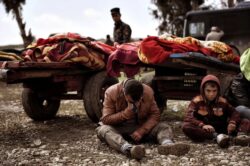U.S. Defense Policy
Cul de Sac: 9/11 and the Paradox of American Power
Toward a Sustainable US Defense Posture: An Option to save $60+ Billion Over Five Years
War and Poverty, Peace and Prosperity
Unified Security Budget for the United States, FY2008
America speaks out: Is the United States spending too much on defense?
Experts give poor grades to expected defense budget proposal
No good reason to boost Army, Marine Corps end strength
The Near Enemy and the Far: The Long War, China, and the 2006 US Quadrennial Defense Review
by Carl Conetta, 01 November 2006. ➪ HTML ➪ PDF. An edited version of this analysis appeared in the July 2006 issue of the World Policy Journal with the title Dissuading China and Fighting the ‘Long War’ (PDF).

The 2006 US Quadrennial Defense Review advanced two new strategic vectors for the US armed forces – one targeted a putative “global Islamic insurgency,” the other put America on a collision course with China.
Report of the task force on a Unified Security Budget for the United States, FY2007
Our Indefensible National Security Budget
Losing Hearts and Minds: World Public Opinion and post-9/11 US Security Policy
(HTML version) (printable PDF version) by Carl Conetta, PDA Briefing Memo #37, 14 September 2006. Reviews the change in global public opinion regarding US security policy since 9/11. It finds that opinion has turned strongly against US leadership, to the benefit of Russia, China and radical Islam.
Fighting on Borrowed Time: The Effect on US Military Readiness of America’s post-9/11 Wars
Pyrrhus on the Potomac: How America’s post-9/11 wars have undermined US national security
Dissuading China and Fighting the ‘Long War’
by Carl Conetta, World Policy Journal, 01 July 2006. ➪ PDF
The 2006 US Defense Review advanced two new strategic vectors for the US armed forces – one targets a putative “global Islamic insurgency”; the other puts America on a collision course with China.
(A longer version of this article was published in November 2006 under the title The Near Enemy and the Far: The Long War, China, and the 2006 US Quadrennial Defense Review.)
Die Europäische Union: Stolpersteine auf dem Weg zur Integration (The European Union: Stumbling Blocks on the Road to Integration)
We Can See Clearly Now: The Limits of Foresight in the pre-World War II Revolution in Military Affairs (RMA)
The Pentagon’s Disconnect Between Planned Forces and Missions
America’s Long War: U.S. Introduces Radical New Strategy
Fighting On All Fronts
‘Something Has to Give’ in Pentagon Spending
QDR 2006: Do The Forces Match the Missions? DOD Gives Little Reason to Believe
Key excerpts from the 18 January 2006 draft of the 2006 Quadrennial Defense Review
Much Ado About QDR: Quadrennial Defense Review Triggers Great Anxiety, Little Change
Is the Iraq war sapping America’s military power? Cautionary data and perspectives
Outsourcing Torture and the Problems of ‘Quality Control’
Outsourcing torture and the problems of “quality control”
The Bush Doctrine: Origins, Evolution, Alternatives
Disappearing the Dead: Iraq, Afghanistan, and the Idea of a “New Warfare”


 by Carl Conetta
by Carl Conetta